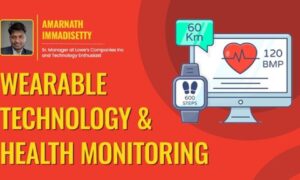The intersection of technology and healthcare has led to groundbreaking advancements in mental health monitoring. Among these innovations, biometric devices have emerged as a powerful tool for tracking and improving mental well-being. These devices, which measure physiological data such as heart rate, skin temperature, and brain activity, are revolutionizing how we understand and manage mental health.
The Rise of Biometric Technology in Mental Health
Biometric technology has come a long way since its inception. Initially used for security and identification purposes, it has now found a significant place in healthcare. Mental health, in particular, has benefited from the precision and real-time data that biometric devices provide. Unlike traditional methods, which often rely on self-reported data, biometric devices offer objective measurements that can detect subtle changes in a person’s mental state.
For instance, wearable devices like smartwatches and fitness trackers now come equipped with sensors that monitor heart rate variability (HRV), a key indicator of stress and anxiety. By analyzing HRV, these devices can provide insights into a person’s emotional state, helping them recognize patterns and triggers. This data-driven approach not only enhances self-awareness but also enables timely interventions.
How Biometric Devices Work in Mental Health Monitoring
Biometric devices function by collecting physiological data and translating it into actionable insights. For example, electrodermal activity (EDA) sensors measure sweat gland activity, which is closely linked to emotional arousal. Similarly, electroencephalogram (EEG) devices track brainwave patterns, offering a window into cognitive and emotional processes.
These devices often integrate with mobile apps or cloud-based platforms, allowing users and healthcare providers to access and analyze data in real time. For instance, a person experiencing heightened stress levels might receive a notification suggesting breathing exercises or mindfulness techniques. Over time, this continuous feedback loop can help individuals develop healthier coping mechanisms and improve their overall mental well-being.
Benefits of Biometric Devices in Mental Health
The use of biometric devices in mental health monitoring offers numerous advantages. First and foremost, they provide a non-invasive and convenient way to track mental health. Unlike traditional methods that require frequent visits to a healthcare provider, biometric devices allow for continuous monitoring in the comfort of one’s home.
Additionally, these devices offer a level of precision that was previously unattainable. By capturing real-time data, they can detect early signs of mental health issues, such as anxiety or depression, before they escalate. This early detection is crucial for timely intervention and can significantly improve treatment outcomes.
Moreover, biometric devices empower individuals to take an active role in their mental health. By providing personalized insights and recommendations, they encourage users to adopt healthier habits and make informed decisions about their well-being. This proactive approach can lead to long-term improvements in mental health and quality of life.
Applications of Biometric Devices in Mental Health
The applications of biometric devices in mental health are vast and varied. One notable example is their use in therapy and counseling. Therapists can use data from these devices to gain a deeper understanding of their clients’ emotional states and tailor treatment plans accordingly. For instance, a therapist might use HRV data to identify stressors and develop strategies to manage them.
Another application is in workplace wellness programs. Employers are increasingly recognizing the importance of mental health and are incorporating biometric devices into their wellness initiatives. By monitoring employees’ stress levels and providing resources for mental well-being, companies can create a healthier and more productive work environment.
Biometric devices are also being used in research to study mental health conditions. Researchers can analyze large datasets to identify patterns and correlations, leading to a better understanding of conditions like anxiety, depression, and PTSD. This research can inform the development of new treatments and interventions, ultimately improving outcomes for individuals with mental health issues.
Challenges and Limitations of Biometric Devices
Despite their many benefits, biometric devices are not without challenges. One major concern is data privacy and security. These devices collect sensitive personal information, and there is a risk of this data being misused or breached. Ensuring robust data protection measures is essential to maintain user trust and comply with regulations.
Another challenge is the accuracy and reliability of these devices. While they offer valuable insights, they are not infallible. Factors like device calibration, user error, and environmental conditions can affect the accuracy of the data. Therefore, it is important to use biometric devices as a complement to, rather than a replacement for, traditional mental health assessments.
Additionally, there is the issue of accessibility. High-quality biometric devices can be expensive, making them inaccessible to some individuals. Addressing this disparity is crucial to ensure that the benefits of biometric technology are available to all, regardless of socioeconomic status.
The Future of Biometric Devices in Mental Health
The future of biometric devices in mental health looks promising. As technology continues to advance, we can expect these devices to become even more sophisticated and accessible. For example, the integration of artificial intelligence (AI) could enable more accurate and personalized mental health monitoring. AI algorithms could analyze data from multiple sources to provide comprehensive insights and recommendations.
Moreover, the development of more affordable and user-friendly devices could expand their reach, making mental health monitoring accessible to a broader audience. This democratization of technology has the potential to transform mental healthcare, making it more proactive, personalized, and effective.
In conclusion, biometric devices are playing a pivotal role in improving mental health monitoring. By providing real-time, objective data, they offer a new way to understand and manage mental well-being. While challenges remain, the potential benefits of these devices are immense.































